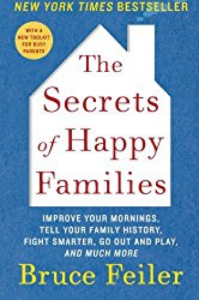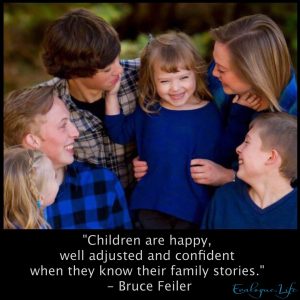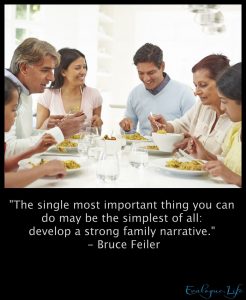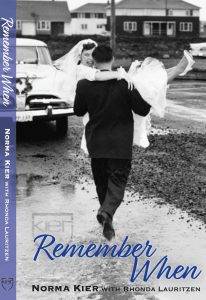
I didn’t set out to write my own family’s story, or anyone else’s for that matter. In 2007 the power of story showed up in my life out of nowhere. It started as a little spark, or a nudge, or in religious vernacular a “prompting,” just to pick up a pen. I never intended to write a book, but somehow felt that I should nurture this creative outlet. It felt like the whisperings of a purpose I needed to fulfill, and I have trained myself to stop, listen and act on these feelings like my parents always did. So, I circled a date on my calendar and decided to simply pick up a pen and begin. When that date arrived, ideas about my parents flowed freely and in the middle of that writing, I got a call my dad had just passed away. The timing, given everything that was on the page was unbelievably uncanny. After the funeral, my mom and I set to work writing their life story, Every Essential Element and the process changed me. What began as a little spark became a fire that gets me out of bed before dawn each day. People’s stories are now my life’s devotion. But why? What is the power of story over us, and why are stories so important for families?
By the way, you might enjoy this short video about learning to listen to that inner voice, and a letter from my dad, 9 years after his death:
What I have learned since beginning this process is that humans are storytelling animals, wired for story in powerful ways. We daydream with our minds telling a running narrative. We dream in story form at night and we literally cannot turn it off. Children act out stories in play. Every movie, television show, and most great songs are stories. Even television commercials grab us with mini vignettes. Interactive gaming creates whole worlds of story in which players become live action heroes. Stories are how we convey our culture and teach children. Every religious text and oral history tradition passes a canon of stories to the next generation. Business stories strengthen the best organizations in the world, and help acclimate new employees to the way it’s done here.
With that overview, I’d like to share three core beliefs I have about about the power of story. They are:
First: Stories have the power to save families.
Second: Stories turn random events into meaning.
Third: Stories are the only way we will be remembered.
I want to begin with the first claim, and one of the most powerful reasons to tell stories. It is, simply:
1. Stories have the power to save families

In my own family, I could not have known when I began writing Every Essential Element that one day, I would have a child who would only know her grandfather, for whom she is named, by his stories. The words I wrote would help my daughter understand what an honor it is to be named for him, and that she is part of a wonderful extended family with a unique set of values. My nieces and nephews told me how much the book meant to them, and that it made them “proud to be an Anderson,” as one nephew put it. The process helped me solidify my own values as the kind of person who acts on faith. It also helped me see my mother as a heroine in an epic love story, and it forever changed my relationship with her.
In addition to my personal anecdotes, there is one very compelling source to check out. In a New York Times Article entitled, “The Stories That Bind Us,” author Bruce Feiler tells of a time when his family reached a breaking point. Fear that his family was falling apart led him on a quest for the best research about what makes a strong family. He poured over the literature and then a surprising theme emerged: “The single most important thing you can do for your family may be the simplest of all: develop a strong family narrative.”
In one powerful study, researchers noticed an unexpected correlation: children who knew a lot about their families did better when challenges hit. They tested the hypothesis by asking children to answer 20 questions like: Do you know where your grandparents grew up? Do you know of something terrible that happened in your family? Do you know the story of your birth?”
“We were blown away,” the researcher said.
Related Article: Getting it Right: Five ways Bruce Feiler taught me how to be a better parent

The children’s answers told whether they had a sense of being part of a larger family, the research stated. Children with the most self-confidence have a strong “intergenerational self.” They know they belong to something bigger than themselves.
(Maybe I was such an angel child because my parents were so good at telling family stories. Seriously they rocked this. And just ask my mother. She’ll totally tell you I was perfect in every way.)
Related: “On gradually losing my mom: She is the sea and she says hush, hush, hush.”
Anyway, back to Bruce Feiler. He goes onto clarify that while all stories carry meaning, some are better than others.
The most helpful narrative is one called the “oscillating family narrative” which goes something like this: “Darlin’, we’ve had good times and we have had some doozies. But no matter what happened, we always stuck together.”
I love that they’re not advising us to Clorox the tale.
 The bottom line of his work: if you want a happier, more resilient family then intentionally create and retell the story of your family’s positive moments and your ability to get through the difficult ones. This one simple act may increase the odds that all of our families will thrive for generations to come.
The bottom line of his work: if you want a happier, more resilient family then intentionally create and retell the story of your family’s positive moments and your ability to get through the difficult ones. This one simple act may increase the odds that all of our families will thrive for generations to come.
Really, I could stop here because this is reason enough to tell family stories. Still, I have two more reasons. The second point in my thesis is this:
2. Stories turn random events into meaning
Since the dawn of creation, humans have been telling stories around the fire. The Bible is in a story format for a reason. (Except for the boring parts we skim over—those aren’t stories. Those are genealogy reports, sprinkled with some beautiful poetry.)
In short, story is how we teach and how we inspire. Story has the power to change people.
Here is one of my favorite examples of how story shapes meaning. In Helen Keller’s autobiography the part that stuck with me is where she describes how as a girl, the world existed for her as amorphous shapes that she did not understand. It was not until she gained language that she fully awakened. The ability to describe the world and put it into words made everything come alive for her. She came alive. As she discovered the world through language, she discovered her purpose in it.
Humans are wired for story. We walk around assigning meaning through language throughout each day. We’re all storytellers in our heads, and most of us will tell anybody who will listen. With just a few facts, we are capable of shaping an entire narrative about what our lives mean. We are storytelling animals.
No story, no meaning.
Finally, my third belief is this:
3. Stories are the only way we will be remembered.
 There was no way I could have known when I began writing my parents’ story that one day I would have a little girl named after my dad, and that she would only know him through the book. Without stories passed on, she would share a name with a headstone but not have a connection to the funny grandpa, the passionate entrepreneur, and the in-love husband that he was.
There was no way I could have known when I began writing my parents’ story that one day I would have a little girl named after my dad, and that she would only know him through the book. Without stories passed on, she would share a name with a headstone but not have a connection to the funny grandpa, the passionate entrepreneur, and the in-love husband that he was.
Maybe there’s a great article or study to back up this third point, but instead I’d like to propose this exercise:
How many of your 8 great-grandparents can you name from memory?
Do details and personality traits come to mind about all 8 of your great-grandparents? Do you know how you take after these ancestors or how you don’t? What were their heartbreaks and joys? Here is a confession. I didn’t even realize I had 8 great-grandparents until I was an adult and did the math. Why? Because I only knew stories about some of them. Now I know them all and I feel like I know them well.
Am I right that the ones you remember have stories attached?
It is curious to me that we spend so much money on granite markers to withstand time, yet these markers only provide a name and a date, maybe a quote. Stone monuments tell nothing about people’s lives or what they learned in their time on earth. It’s a sobering thought to me that by the time the last person dies who personally knew me, the ONLY memory will be stories passed down. Two generations, that’s all it will take to wipe out all memory of me.
Related: Coco reminds us what is truly important: family. Past, present and future.
The power of story in Your Life and in your business:
 I have seen people transform and grow through the telling of their story. In other words, they sometimes grow right before my eyes. This usually happens when I am interviewing someone for a full book. It happened in the process of writing Remember When, with Norma Kier. She conquered her greatest fear at age 80 while we were still writing the ending.
I have seen people transform and grow through the telling of their story. In other words, they sometimes grow right before my eyes. This usually happens when I am interviewing someone for a full book. It happened in the process of writing Remember When, with Norma Kier. She conquered her greatest fear at age 80 while we were still writing the ending.
Related: New Book – Remember When – shows us truth is better than fiction
There are times when I see something in the teller of a story that her or she may not have noticed in themselves. When I write about their life, they see it through a new lens and it often it solidifies their strengths or points out fences that still need mending while there is time.
In my own family, I have become more intentional to preserve the ongoing narrative of our story because I know it will strengthen us now, and in the future. I write each story as a love letter to the future, much like the one I found from my dad in the video above.
Related: How to Curate your Canon of Business Stories
In my experience doing family interviews, writing and speaking, most people intuitively know the value of personal history, but they’re burdened by the work. They don’t know where to start, or they don’t believe they have the writing skills. That is why I started this business and why it is such a joy to do this work. I hope you enjoy all the free tools and resources at Evalogue.Life, and that we can connect.
Related: Story endings – the transformative power of storytelling
This article contains affiliate links with Amazon which means if you buy one of the books I mentioned using our links we make a small commission. Thank you! It really helps us write free articles like this.
 Rhonda Lauritzen is the founder and an author at Evalogue.Life – Tell Your Story. Rhonda lives to hear and write about people’s lives, especially the uncanny moments. She and her husband Milan restored an 1890 Victorian in Ogden, Utah and work together in it, weaving family and business together. She especially enjoys unplugging in nature. Check out her latest book Remember When, the inspiring Norma and Jim Kier story.
Rhonda Lauritzen is the founder and an author at Evalogue.Life – Tell Your Story. Rhonda lives to hear and write about people’s lives, especially the uncanny moments. She and her husband Milan restored an 1890 Victorian in Ogden, Utah and work together in it, weaving family and business together. She especially enjoys unplugging in nature. Check out her latest book Remember When, the inspiring Norma and Jim Kier story.
Questions Everyone Should Ask

Don't have regrets. Preserve a life story now with our all-time best questions. Interview a loved one or prompt your own personal history. Do it now, and it will be enough.

Pingback: Remember who you are. Help your kids put down their phones and remember.
Pingback: There are no coincidences - prayer and the uncanny - Evalogue.Life - Tell Your Story
Wow! Rhonda, very very cool. I wish you all the success in the world. And I hope you never run out of stories to tell, and to help tell.
Thanks so much, Corey. Your encouragement means a lot, especially during a start-up phase that is by nature a bit scary.